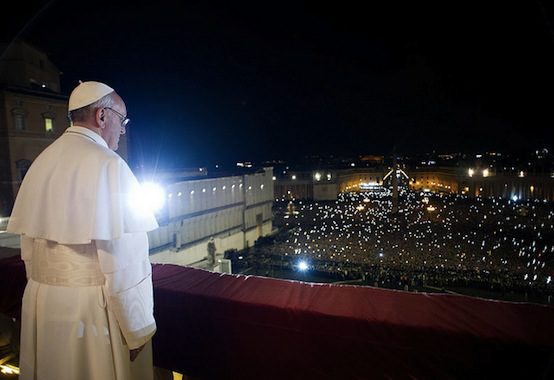So He Gave Himself a Name

As an outsider, I’ve been utterly transfixed by the last two papal conclaves (at 36, the only ones I can remember)—the white smoke; the crowd of people, with their diverse faces, in St. Peter’s Square and the Road of Consolation; the sheer theater of waiting for a newly empowered man to emerge from behind a curtain. In its mystery and pomp and historical continuity, the election of a pope is an echo of the ancient that’s utterly absent (by design) in the vulgar rituals of modern democratic politics.
Not being Catholic, I couldn’t identify with the reporting on Vatican intrigue and “frontrunner” cardinals leading up to the conclave. I did not know Bergoglio from Scola from Erdo. Consequently, I found myself wondering, more than anything, which regnal name the eventual pope, whoever he turned out to be, would take for himself. I find this idea of symbolically re-christening oneself, and thus signaling to the world what kind of leader one intends to be, tremendously powerful.
In our own politics, we do this informally and hagiographically. Reagan was Goldwater II. Clinton was JFK II. Or Obama is FDR III. Imagine these men being able and expected to attach such names to themselves, and then to be remembered by them long after they’re dead.
The power of naming to shape or predetermine identity is a well-documented thing. We encounter it almost immediately in the Bible. God gives Adam dominion over the earth and commissions him to name the animals. In his first intervention into human history after the creation, fall, and flood, God assigns a childless elderly couple, Abram and Sarai, with the progenitorship of a special new people. Later, God renames that man’s grandson “Israel.” And much later, he takes the persecutor of Christians Saul of Tarsus and repurposes him as “Paul,” the greatest of all evangelists.
Shakespeare wrote of the power of names, too, as did Freud, who, the Argentine psychiatrist Juan Eduardo Tesone writes, believed that a given name places a child “in a genealogy that partly determines the place the child comes to occupy”:
The princeps function of the family is to give the child a place that generates otherness. It is through the interpellation of his given name that the child begins to recognize himself as a being-separate-from his parents. He answers to his given name long before he can say “I,” an ontological anteriority that confirms him in his own identity and precedes the possibility of his announcing himself with his personal pronoun separated from the “you.”
The characters of a Bruce Springsteen track reflect on the qualities of themselves that they wish they could excise: “Billy got drunk, angry at his wife / He hit her once, he hit her twice / At night he’d like in bed, he couldn’t stand the shame / So he gave it a name.”
But given names are not taken names. Before his election to the papacy, “Jorge” was unknown to 99.99 percent of the world. He was a blank slate. Now the world knows, and will remember, this man as “Francis” and associate with him the ethos of a revered historical figure.
A neat trick!
On a much smaller scale than the See of Peter, I think of the example of John Mellor, a son of postwar British privilege who, having rejected his roots, became a singer and took to calling himself “Woody,” after Woody Guthrie. Eventually, he renamed himself Joe Strummer—a nod to his ordinary Joe-ness and his penchant for strumming all six strings of the guitar, rather than the “fiddly bits” favored by arena-rock soloists. The arc of Strummer’s life is captured beautifully in Julien Temple’s documentary “The Future is Unwritten”. Owing at least in part to the power of his self-chosen name, I think it might be said that Strummer invented his true identity. (You can’t easily imagine a “Woody Mellor” as the frontman of the Clash, can you?)
Jorge Mario Bergoglio got to do something like that yesterday, and on a world-historical stage.
Comments